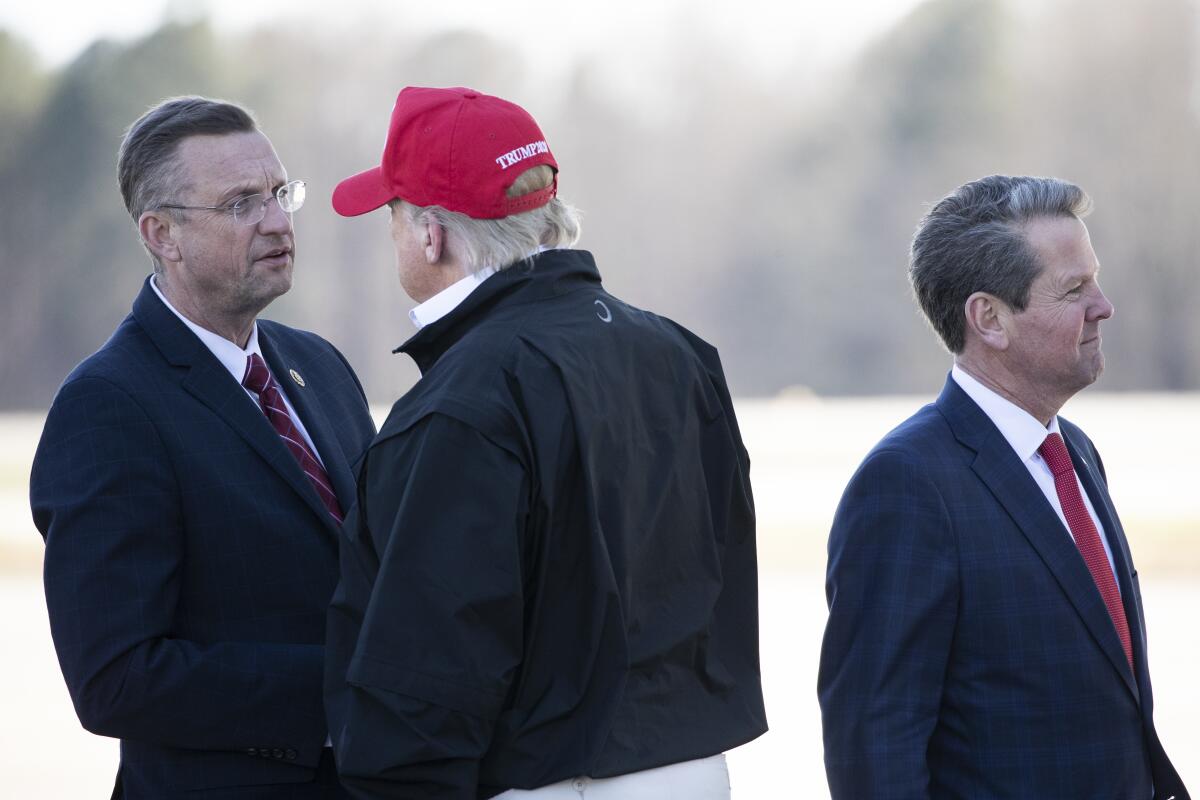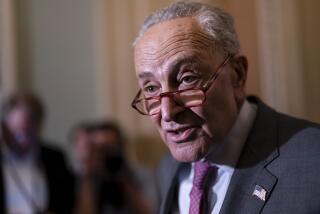7 lawmakers and several congressional staffers exposed to coronavirus

WASHINGTON — The impact of the coronavirus drew closer to Washington as seven lawmakers announced they have been exposed to someone diagnosed with COVID-19, and Republicans and Democrats considered separate legislative packages to address the economic fallout.
Six Republicans were exposed to a single person with the novel coronavirus at a conservative political conference late last month, and California Rep. Julia Brownley (D-Westlake Village) met in Washington last week with someone later diagnosed with the virus. None of the lawmakers, or their staffers who were also exposed, has reported any symptoms of the disease.
Five of the Republicans — Rep. Doug Collins of Georgia, Sen. Ted Cruz of Texas, Rep. Matt Gaetz of Florida, Rep. Paul Gosar of Arizona and Rep. Mark Meadows of North Carolina — said they would self-quarantine, while Brownley said she and her staff would work remotely and engage in “self-monitoring and maintaining social distancing practices.”
Brownley closed her Washington office for the week. Brownley’s chief of staff, Lenny Young, declined to say where in Washington the exposure took place and described it as “incidental exposure to someone who was asymptomatic at the time.”
Young said the contact did not warrant a self-quarantine, but Brownley decided to limit her activities “out of an abundance of caution.”
Rep. Louie Gohmert (R-Texas), another Republican lawmaker exposed to the person at the Conservative Political Action Conference, was back at work on Capitol Hill on Monday.
He said on Twitter that a Centers for Disease Control and Prevention official “advised that my staff and I should just be careful to observe proper hygiene protocols. I took the advice of the expert and returned to work. No one is panicking and we are observing the recommended precautions.”
The exposure of seven lawmakers brings the coronavirus into stark relief for lawmakers and raises new questions about whether the work of Congress will be affected. They are a group of generally older people who frequently fly on planes and attend large events where they shake hands with many people.
Congressional leaders on Monday said there was no need to alter operations. “At the present time, there is no reason for us not to continue with our vital legislative work in the Capitol,” Speaker Nancy Pelosi (D-San Francisco) wrote in a letter to Democrats. Democrats planned to meet Tuesday morning with Capitol Hill administrators and the attending physician of the Capitol on “the continuity of operations protocols for the Capitol and to prepare our offices.”
But even as they grapple with their personal risk, lawmakers are under growing pressure to construct an economic stimulus package to respond to the economic fallout of the virus’ spread.
Senate Finance Committee Chairman Charles E. Grassley (R-Iowa) is considering “targeted tax relief measures that could provide a timely and effective response to the coronavirus,” according to his spokesman, who added that several options are being considered. He declined to reveal specifics on Monday but that tracks with ideas floated by White House senior economic advisor Larry Kudlow on Friday, who pointed to the travel and tourism sector that may need economic support.
Both Kudlow and Treasury Secretary Steven T. Mnuchin will join Senate Republicans at their lunch Tuesday to discuss it.
But Pelosi and Senate Minority Leader Charles E. Schumer (D-N.Y.) say any economic stimulus package must include paid sick leave for quarantined workers and parents, and enhanced unemployment insurance, among other measures. House Democratic leaders will meet Monday evening to discuss next steps to address the economic effects of the coronavirus, according to a senior congressional aide.
Details of any kind of economic stimulus plan are still in their infancy. But Republicans and Democrats have vastly different ideas on the best response to the virus and its economic fallout — a potentially troubling sign for quick movement on legislation.
Still, lawmakers moved relatively swiftly on the $8.3-billion plan enacted last week to fund the government’s response to the coronavirus, which included vaccine research and loans for affected small businesses.
Any kind of economic stimulus plan would amount to a tacit acknowledgment that the economy is weak enough to warrant a stimulus — something the White House may be reluctant to embrace months ahead of the November election.
Democrats were sharply critical of any plan that would boost cruise, airline or other travel companies.
“The administration and Republicans want to focus on preserving the economic stability of large corporations and their millionaire and billionaire CEOs, but I think that given politics, they may be willing to negotiate where we can put the health and safety of American families first and ensure we work to prevent a severe recession,” said Rep. Raul Ruiz (D-Palm Desert), a physician.
Ruiz, whose home county of Riverside was the first to take in and quarantine repatriated Americans, said any future stimulus may need to take into account additional costs faced by those localities. The $8.3-billion plan approved last week provided some reimbursement to localities, but it is unclear whether it will be enough.
Democrats say any stimulus bill must also include food security, such as including expanding school lunch programs; free and accessible coronavirus testing; and assurance that patients will be reimbursed for non-covered coronavirus expenses. Rep. Rosa DeLauro (D-Conn.) and Sen. Patty Murray (D-Wash.) have introduced a bill to require employers to provide seven days of paid sick leave and provide an additional 14 days immediately after a public health emergency, including the coronavirus outbreak.
“We have no paid family leave in this country; paid sick leave is not universal. We probably need to enhance unemployment insurance,” said Rep. Donna Shalala (D-Fla.), a former secretary of the Department of Health and Human Services in the Clinton administration. “There are lots of things we need to do before we bail out the major industries. And by the way, they just got a huge tax cut,” she added, referring to the GOP tax cuts enacted in 2017.
Senate Republicans conveyed skepticism about passing a quick economic stimulus package, suggesting it may be too soon to know what is needed. But they indicated they’re open to hearing from administration officials on Tuesday.
“It’s awfully early,” said Sen. Richard M. Burr (R-N.C.). “They need to tell us what they need. Nobody is going bankrupt.”
Except for Gohmert, the lawmakers exposed at CPAC said they would quarantine themselves out of an abundance of caution. Gosar said three of his senior staff members who also spent time with the individual were taking similar measures. Two of Collins’ staffers were doing the same.
Gaetz was criticized by some other lawmakers last week after he seemed to mock concerns about the coronavirus by tweeting out pictures of himself working in the Capitol in a gas mask. His office said that was how he “demonstrated his concern.”
Collins spent time with Trump on Friday at the Centers for Disease Control and Prevention in Atlanta, where they participated in a tour alongside other health officials working to combat the virus, including CDC Director Robert Redfield and Health and Human Services Secretary Alex Azar.
Gaetz flew on Air Force One with Trump on Monday, before he announced his self-quarantine. Meadows was named Friday to become Trump’s new chief of staff, replacing Mick Mulvaney.
Because the interaction was 11 days ago, the four GOP lawmakers said they would quarantine until they passed 14 days after the exposure.
The person with coronavirus recalled meeting “several” members of Congress at the event, and the Office of Attending Physician on Capitol Hill notified those members of their exposure on Saturday, according to the office. The office did not disclose the total of how many lawmakers were exposed.
At least two lawmakers, Reps. Ro Khanna (D-Fremont) and Josh Harder (D-Turlock), announced Monday they would convert their separate in-person town hall meetings to a virtual one to be conducted on Facebook Live and a telephone town hall, respectively.
Responding to reporters’ questions, some lawmakers said that closing the Capitol at this time would send the wrong message to the public.
“There’s a lot of people watching us,” said Sen. John Cornyn (R-Texas). “I think it’s important for us to act prudently but not panic. And [recessing Congress would] send a signal to an awful lot of people around the country.”
Pelosi indicated that congressional offices will have technology in place to have people work from home, if needed.
However, lawmakers need to physically be in the House or Senate chamber to hold votes on legislation.
Times staff writer Jenny Jarvie contributed to this report.
More to Read
Get the L.A. Times Politics newsletter
Deeply reported insights into legislation, politics and policy from Sacramento, Washington and beyond. In your inbox three times per week.
You may occasionally receive promotional content from the Los Angeles Times.











